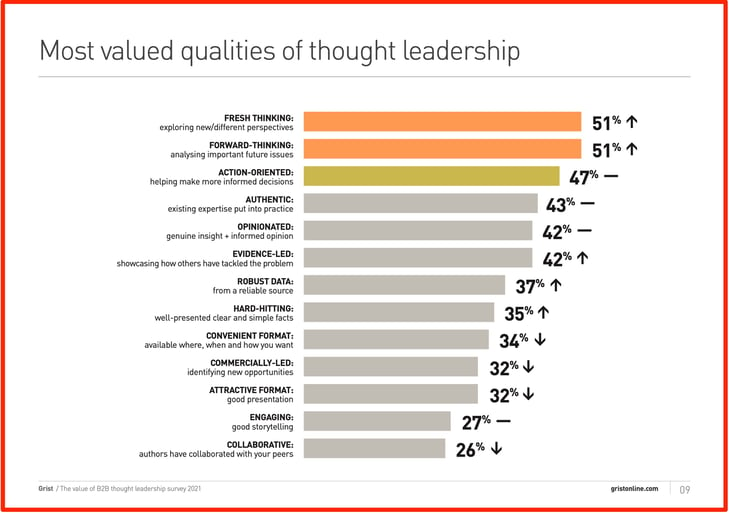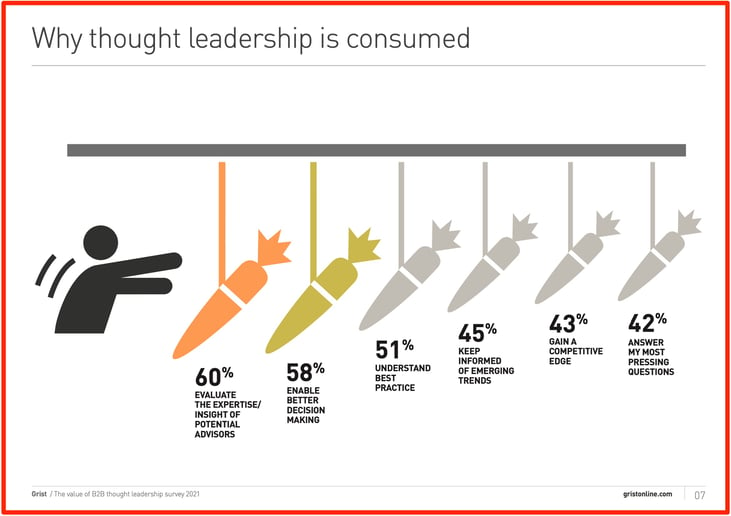
Consulting Leaders, Stop Outsourcing Your Thought Leadership Responsibility to Marketing!
.jpg?width=56&name=francescorizzato8%20(1280px).jpg)
“Luk, as a Practice Lead, I oversee a team of 25 consultants across four countries. I don’t have time anymore for marketing and business development. Besides, that’s what I have my marketing team for.”
This stance stood out to me on a call I had the other day with a Regional Practice Lead of a large consultancy.
He wanted to explore the possibility of hiring me to run a workshop for consultants in his practice on how to establish and expand their reputational footprint.
I have calls like this regularly – at least 3-4 per month. And a common theme has been emerging, highlighted perfectly in this conversation I had.
Now, this Practice Lead strongly believes in the power of expertise-driven education to grow a consulting business. He used to spend at least a couple of hours each week sharing his latest experiences.
However, as he grew professionally and became a consulting leader, he found himself with less time and interest in continuing to put in as much effort.
And that’s a big no-no in my book! As your consultancy grows or you get promoted to a leadership position or expand your practice, you can’t diminish your commitment to sharing your expertise as a thought leader. That’s when you exponentially increase your leading thought output.
Consulting growth is determined by the level of domain expertise and trust you can build. Marketers can’t achieve this without significant contributions from senior consultants.
Marketing assets vs. marketing exposure
Marketing and business development in consulting is based on two pillars: marketing assets and marketing exposure.
- Marketing assets are the content resources: case studies, articles, webinars, testimonials, podcasts, interviews, trend research, etc.
- Marketing exposure is the strategy for promoting or distributing these assets at scale.
Successful marketing and business development strategies are based on high-quality, expertise-driven, value-adding assets that are appropriately distributed to the right audience through the proper channels.
“Don’t create to put something — anything — out there without considering if what you’re sharing is valuable or useful to your audience”. (Felicia C. Sullivan)
Let’s dive deeper into the two pillars of marketing and business development.
Recommended reading: 5 Reasons Consulting Leaders Are Missing the Digital Train
Marketing assets
You can hire the most brilliant marketers who know SEO best practices, are fluent in various marketing automation technologies, and can efficiently manage social media accounts.
But, if you are not driving their efforts by providing them with quality assets, you are setting them up for failure. And your consultancy.
Here’s the thing. Marketers are not experts in your expertise domain. Sure, they can – and should – have a decent understanding of the field. However, they didn’t spend the last 10/20/30 years specializing in that domain, working with clients, and deepening their knowledge.
They can’t possibly produce the same level of educational value that you, as a senior expert, can. Why would you want your marketing team to work with subpar assets?
Your responsibility as a consultancy leader is to produce content that communicates leading thoughts, addresses the target audience’s prototypical pain points, offers insights and solutions, identifies trends, provides fresh perspectives, inspires clients, and explains the costs or risks of inaction, etc.
Marketing assets build trust and authoritativeness. They determine whether your practice/consultancy is at the top of your prospects’ minds as the go-to experts.
60% of buyers say that a consulting firm’s expertise is the factor most likely to substantially impact the price they are willing to pay for the services. (Source: Source Global Research, Pricing: Your biggest barrier to change?)
Times have changed. Buyers are no longer interested in marketing fluff – they get bombarded by it so much that they simply block it out.
People buy from people they know, like, and trust. Brands can help to build trust, but buyers want to feel like they know the experts behind a brand. Brands don’t solve problems, experts do.
Buyers of consulting services want to get inspired by leading thinkers, not by marketing pros and clever PR executives.
As a consulting leader, you become not only the voice of your personal brand, but the voice of your consultancy/practice.
When your consultancy grows, your practice expands, or you get appointed to a leadership position – that’s not the time to drop the ball. It’s time to exponentially increase your body of work.
Leading thinkers are fearless with the development of new content. They never, ever stop.
They write original, fresh content that inspires and educates. They convey their deep levels of expertise with their ability to identify patterns, address specific pain points, predict trends, and offer practical advice.
Marketing exposure
Once you produce an asset, it’s the marketing team’s time to shine. It’s their job to maximize the exposure of the assets to the target audience.
Your marketers should be working on:
- Polishing up your thought leadership content
- Optimizing it for target keywords
- Identifying ways to repurpose the content
- Determining the proper channels for promotions and scheduling the promos
- Creating graphics to support the content
- Measuring the reach and engagement of the content along with other metrics
- Setting up demand-capturing campaigns and funnels
- Putting together newsletters to strengthen the educational efforts
- Looking for new ways to reach the target audience
- Testing, experimenting, measuring, and adjusting campaigns based on data and client research
Marketers play an important role in ensuring the target audience understands the depth of your consultancy’s expertise.
However, marketing is their expertise domain. Not HR technologies. Not digital transformation. No investment opportunities in Asia. Not an SAP implementation. This is what YOUR expertise domain is.
Here’s what your prospects are expecting from your content:
- 51% of prospects are looking for content that explores new/different perspectives.
- 47% are interested in action-oriented content to help make more informed decisions.
(Source: grist, Value of B2B thought leadership)
To give your prospects what they want – nay, expect! – you need to provide your marketing teams with the right assets.

Recommended reading: The Single Biggest Mistake Consultancies Make: Talking About Themselves
Lead by example
Empowering marketing teams to deliver strong results is a massive reason why you, as a consulting leader, must keep producing leading-thought content.
And, you must lead by example!
As a consulting owner, partner, or practice leader, you are primarily responsible for shaping the culture in your practice/consultancy.
It is up to you to set an example of how authoritative, educational content is created, promoted, and converted into domain authority and new clients.
Every consultant in your firm should learn the foundational elements of expertise-driven business development. And it is up to teach them the ropes, to share your knowledge on how to approach content, dive to the heart of the problem of the audience, etc.
Creating such a culture ensures that business development does not solely rest on your shoulders. Everyone on the team will start contributing to the business development process.
How amazing would that be!
According to grist’s Value of B2B thought leadership survey:
60% of decision-makers use thought leadership content to evaluate the expertise/insight of potential advisors.
Furthermore, as the visual below from grist shows, 58% of executives are looking for content that will enable them to make better decisions, and 51% are interested in understanding best practices.

What do you want your prospects to see when they research your consultants?
Sporadic mentions that don’t clearly depict their expertise and past experience? OR, a library of thought leadership content showcasing their level of knowledge and building trust with the audience?
“Give people an abundance of confidence in your expertise by creating an abundance of value and share it again and again”. (Seth Godin)
Recommended reading: Why Are Consultancies Appointing New Partners Without a Voice?
How to align consultants’ work with the marketing team’s work
I’ve talked quite a bit in this article about why consulting leaders should continue producing thought leadership content as their responsibilities grow. I also covered the types of activities marketing teams should engage in.
So the question is then: How do you align the work of consultants and marketers?
In my experience, it’s all about creating a mutually-dependent strategy and clearly outlining commitments:
- As a consulting leader, you should commit to an X number of educational content pieces per month/week. It would be best if you were reliable. Don’t make marketing executives chase you, send you follow-up emails, and put planned campaigns on hold. You need to be a team player!
- Marketing should plan campaigns around expertise-sharing pieces. Which newsletter will feature which piece? How can you break down a larger piece of content into smaller insights that can be distributed via social media? What types of visuals would enhance the point of a piece? These are the types of questions that marketing leaders need to determine in their campaign prep.
- Work with your marketing on identifying relevant subjects. Set up a system that allows you, your consultants, and marketers to brainstorm and exchange ideas. For example, marketing can analyze comments on your posts and offer briefs on what questions/issues come up most. You and your consultants can look through your inbox every week or two and see the types of pain points/questions that are commonly brought up by clients and prospects. This way, you create a repository of content ideas.
- Marketing must set up a system to measure the impact of expertise-driven content and track engagement with it. One of the best ways for you, a senior leader or owner/partner, and your consultants to stay motivated as you produce authoritative content is to see the difference that it makes. It’s the job of your marketing team to monitor the impact of sharing your leading thinking on generating and capturing the demand for the expertise and linking it to revenue development. It is also up to the marketing team to use this data to derive insights and make adjustment suggestions to the overall strategy.
In conclusion
If you think you’re too busy to continuously grow your reputational footprint through content that educates your audience and showcases the depth of your expertise, you need to re-evaluate your priorities as a consulting leader.
Because here’s a simple truth: your prospects will not be convinced simply by your title. Whether you are a practice lead, a consultancy owner, or a senior consultant, you are not above the need to build trust with your audience.
This can only be done by showcasing your expertise through generous knowledge sharing.
Do you deeply connect with the problem(s) of your clients/prospects, and are you able to inspire them to move from the old (problem status) to the new (problem-solved status)?
You cannot leave all marketing and business development up to the marketing team. No matter how amazing they are at what they do, if they don’t have content that they can sink their teeth into, they will always deliver subpar results.
Finally, as a consulting leader, your job is to lead! Lead other consultants by example. Show them the power of educating the target audience. Coach them on best practices. Engage with their content. Make suggestions. Help them excel at business development.
You are not an inspiring leading thinker? You are not a consulting leader (yet).
Interested in receiving all my learnings to become a better consultant? No spam, no BS. Pure teaching! Subscribe to my newsletter.
.jpg?width=66&name=francescorizzato8%20(1280px).jpg)
Luk’s extensive career in the consulting business, which spans more than 20 years, has seen him undertake a variety of influential positions. He served as the European CHRO for Nielsen Consulting (5,000 consultants in the EU), founded iNostix in 2008—a mid-sized analytics consultancy—and led the charge in tripling revenue post-acquisition of iNostix by Deloitte (in 2016) as a leader within the Deloitte analytics practice. His expertise in consultancy performance improvement is underlined by his former role on Nielsen's acquisition evaluation committee. After fulfilling a three-year earn-out period at Deloitte, Luk harnessed his vast experience in consultancy performance improvement and founded TVA in 2019. His advisory firm is dedicated to guiding consulting firms on their path to becoming high-performing firms, drawing from his deep well of consulting industry expertise and financial acumen.

